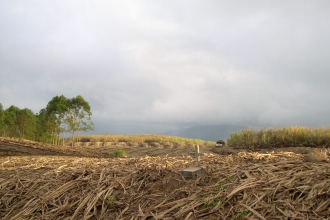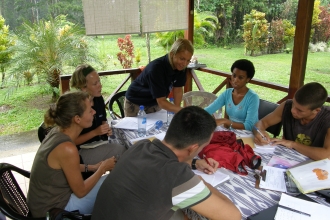Quality of Life in Urban Neighborhoods in Costa Rica
Research Fellows Juan Robalino and Roger Madrigal made an important contribution for the Inter-American Development Bank’s project called Quality of Life in Urban Neighborhoods in Costa Rica.
Research Fellows Juan Robalino and Roger Madrigal made an important contribution for the Inter-American Development Bank’s project called Quality of Life in Urban Neighborhoods in Costa Rica.
Little is known about land cover change in mixed agroforestry systems, which often supply valuable ecological services. The authors use a spatial regression model to analyze clearing in El Salvador’s shade coffee–growing regions during the 1990s.
A nature field experiment and a choice experiment of the payment system of voluntary contribution. Evidence from Cahuita National Park in Costa Rica.
The authors estimated the deforestation impact of Costa Rica’s pioneering environmental services payments program (Pagos por Servicios Ambientales, or PSA) between 2000 and 2005. Despite finding that less than 1 in 100 of enrolled land parcels would have been deforested annually without payments, the program’s potential for impact was increased by explicitly targeting areas with deforestation pressure and increasing some payments to enroll land that would have been cleared.

Francisco Alpízar y Milagro Saborío wrote an article (Más preguntas que respuestas) for “La Nación” (1 June 2008) the most important newspaper in Costa Rica on the topic of biofuels. (Spanish only) El…
This article presents a case study of development of a Payments for Ecosystem Services (PES) program related to drinking water in the city of Copán Ruinas, Honduras. (Text in Spanish)
The methodology used for the design and the implementation of this program is based on an integrated and adaptive management approach. It includes the following elements: general diagnostic, definition of objectives, analysis of enabling conditions, technical design, implementation and evaluation.
Just how important social context is for voluntary contributions is investigated in a natural field experiment, where subjects made either actual or hypothetical contributions to a national park in Costa Rica.
This study found that both anonymity and information about others’ donations influenced contributions, implying that validity testing of stated preference methods needs to include comparisons of hypothetical and actual behavior for given social contexts.
In a natural field experiment, the authors quantified the importance of anonymity, reciprocity, and conformity through the provision of social reference levels in order to explain voluntary contributions. In the study setting, the effects of the various treatments were small, suggesting that the self-image as an honorable person, irrespective of other people’s opinions, could be an important explanation of contribution behavior. The experiment overall showed no clear evidence that current practice by charitable organizations is inefficient.
A promising concept that has received considerable attention, Payment-for-ecosystems- services has the potential to become a conventional environmental management tool.

A promising EfD project aims to investigate the determinants of these contributions, understanding the motivations behind donations and how external factors influence them. Cahuita is a National Park…